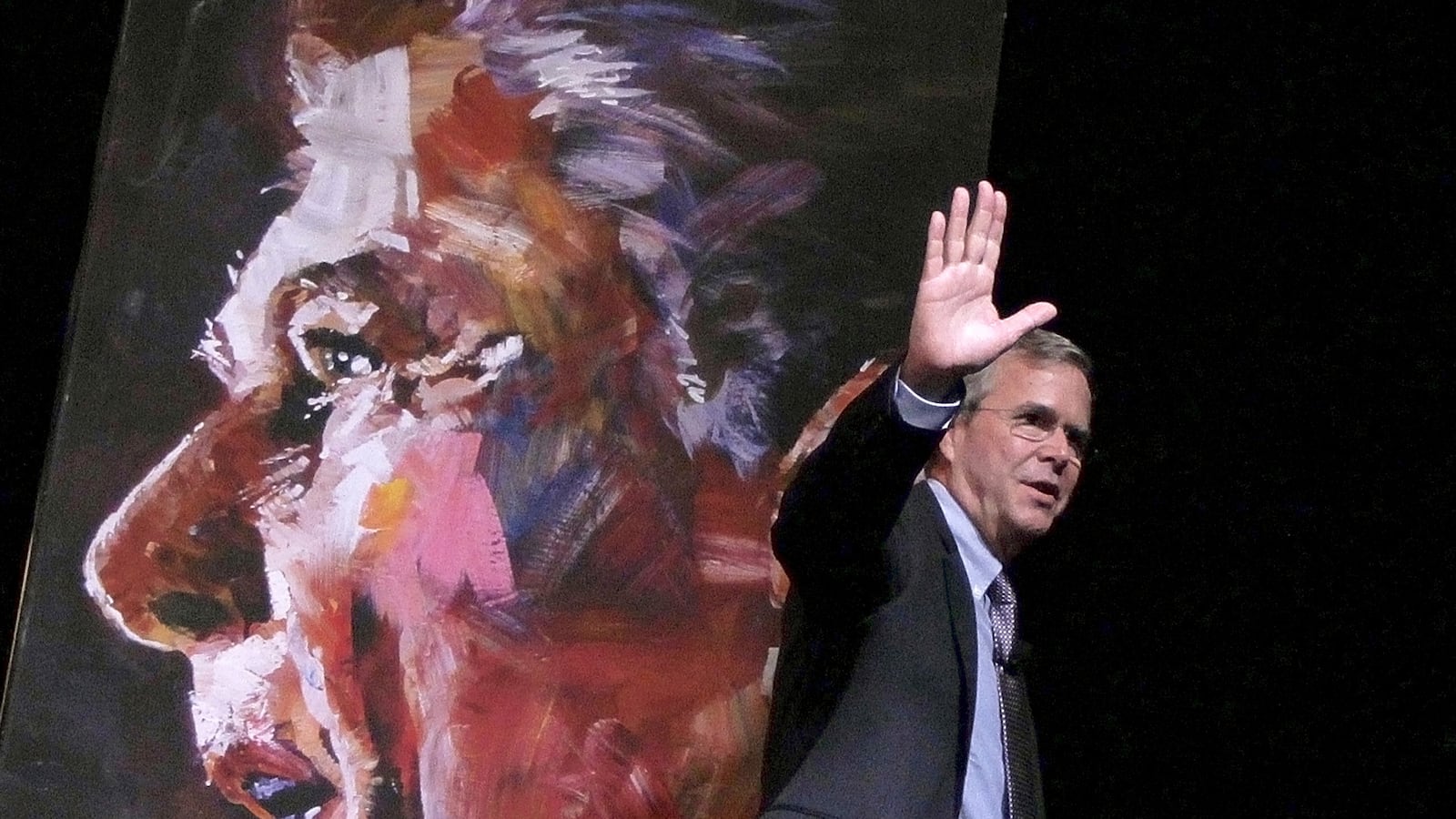Jeb Bush’s Iraq policy sounds a lot like that of another American president—but not his brother’s. It’s President Obama’s.
In a sweeping address Tuesday evening, the former Florida governor pledged that if he were elected president, the United States would intervene more deeply in the Middle East to fight Islamic extremism. But there appear to be two competing instincts in Bush’s anti-ISIS foreign policy: an Iraqi strategy that looks suspiciously like Obama’s in its cautiousness, and a strategy in Syria that involves a serious escalation of American involvement.
“Well into this nightmare, President Obama’s administration, by its own admission, has no strategy to stop it. In place of one, they are pursuing a minimalist approach of incremental escalation,” Bush told a crowd at the Ronald Reagan Presidential Library in California. “The results have been a creeping U.S. involvement without any strategic results, the worst of both worlds.”
Bush is calling for a change in America’s policy in Iraq—but certainly not an aggressive policy shift. Indeed, many of the things he is advocating for are being pursued by Obama and his administration. The former governor called for “support[ing] the Iraqi forces” and “greater engagement with Sunni tribes,” and for providing additional aid to Kurdish fighters who are fighting ISIS.
The Obama administration is supporting Iraqi forces and is already providing aid to Kurdish fighters. And on the issue of arming the Kurds directly instead of the current policy, sending aid through the central Iraqi government, an issue his fellow Republicans have raised, Bush is silent. The former Florida governor also called for the use of American airpower against ISIS fighters—something the U.S.-led air campaign launched by Obama is already doing.
“After excoriating the Obama administration, what does Governor Bush propose for Iraq and ISIS? He appears to propose doing pretty much the same thing that President Obama is doing. What is he suggesting we do differently? More boots on the ground? If that is what he wants—more American boots on the ground in combat in Iraq—he should come out and say so,” said Jake Sullivan, a senior policy adviser for Democrat Hillary Clinton’s campaign, in a prebuttal of Bush’s speech.
By delivering another speech about national security, Bush is inviting comparisons to his brother George W. Bush, the president who made the fateful decision to invade Iraq. But on Iraq policy itself, Jeb Bush sounds more like his brother’s successor. Despite praising the surge implemented by the Bush administration, Jeb Bush has made no firm suggestion that additional U.S. troops be sent to Iraq.
Instead, the former governor leaves open the door to more forces while pointing out that regional allies are not calling for them. “We have around 3,500 soldiers and Marines in Iraq, and more may well be needed. We do not need, and our friends do not ask for, a major commitment of American combat forces,” he said Tuesday.
The changes Bush is calling for are slight, especially considering that Senator Lindsey Graham, a hawkish contender for the Republican presidential nomination, is calling for up to 20,000 additional ground troops in Iraq; and GOP primary front-runner Donald Trump is calling for an invasion to seize oil infrastructure in ISIS-held areas.
The former Florida governor’s proposals are more minor tweaks to the role Americans would play. The United States would deploy forward air controllers to direct airstrikes, and troops already in the country would embed with the Iraqi forces they train, joining them on missions.
Bush’s policy proposals for Syria are much more aggressive and require a substantial increase in American military might to implement.
A Jeb Bush administration would create safe zones in Syria to protect civilians from ISIS and from Syrian dictator Bashar al-Assad. Those would be combined with a no-fly zone, enforced by American and coalition airpower. Both are serious commitments that run the risk of dragging America even deeper into the conflict.
“A no-fly zone is a critical strategic step to cut off Assad, counter Iranian influence, keep the pressure on for a settlement, and prevent more needless death in a country that has seen so much of it,” Bush said.
Compared to Trump, Bush is a foreign policy genius. And his speech is the most detailed plan for fighting ISIS in Iraq and Syria that any Republican or Democratic presidential candidate has presented to date.
But cutting through the rhetoric, some questions remain.
Bush calls for additional resources to increase U.S. military capacity, a problem brought about by budget cuts known as sequestration. “I assure you: The day that I become president will be the day that we turn this around and begin rebuilding the armed forces of the United States of America,” he said.
An anagram of sequestration is “senators quiet,” and lawmakers have thus far been unable to come to an agreement on how to reverse the budget cuts in both military and non-military programs. The former Florida governor doesn’t explain where the money for investing in the armed forces would come from.
Bush also calls the Iran nuclear agreement “unwise in the extreme.” But he does not outline any alternative to the Iran deal. How should America proceed once it has followed his advice and rejected the deal?
“It should be rejected by the Congress of the United States of America,” he said. Nevertheless, he added, “knowing what has gone wrong, however, is not the same as knowing how to set it right.”





